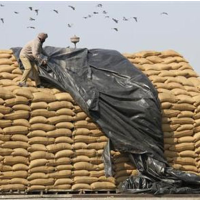India Holds Up WTO Deal Over Food Subsidies
 The government keeps food stocks of 62 million tonnes of rice and wheat for distribution at subsidized prices (photo: Reuters)
The government keeps food stocks of 62 million tonnes of rice and wheat for distribution at subsidized prices (photo: Reuters)
India is talking tough over food subsidies as the World Trade Organisation (WTO) deal heads to the wire. Diplomats from 160 member countries are meeting in Geneva to confirm the WTO’s first-ever global trade agreement that was agreed in Bali last December, which could add $1 trillion to the world economy and create 21 million jobs.
But India is threatening to use its veto unless it receives assurances on food subsidies, Trade Minister Nirmala Sitharaman said on Friday.
"While there has been progress on the Trade Facilitation Agreement, other decisions, including a decision on public stockholding for food security purposes and other development issues, have been sidelined," Sitharaman said in a written reply to a question in Parliament.
"Till there is an assurance and visible outcomes...India would find it difficult to join the consensus on the Protocol of Amendment," she warned.
Informal talks are underway to resolve the impasse before a July 31 deadline.
A group of 25 countries including Australia, Canada, Colombia, Mexico, Norway, Switzerland and Thailand, said they were "dismayed" at the failure to seal the trade facilitation deal. They warned this could unravel the package of agreements made in Bali, effectively destroying the chance of liberalising global trade.
"A decision to step away would be in no one’s interest. It would seriously undermine the ability of the WTO to deliver for the future," the group said in a statement.
Japan also said it strongly urged "those members who take a "contradictory stance" to try to achieve the common objective.
According to Reuters, several diplomats said they were surprised by India's stance, since it has reportedly not made any specific demands, making it difficult for the other countries to resolve the problem.
Some think India might want to bring forward the 2017 target date for agreeing permanent rules on food stockpiling, or it might try to postpone the July 31 deadline for adopting trade facilitation, linking it to wider negotiations that the WTO plans to line up later this year. But the European Union said it would not renegotiate existing deadlines.
Many diplomats thought India would be reckless to use its veto.
“It will be suicidal, absolutely. And that’s not a threat, that’s just a statement of fact,” a Western diplomat told Reuters.
“They say we’re going to get what we want or we’ll blow everything else up, but if they do that they won’t even get what they want.”
If global trade negotiations lose momentum again, many WTO members, including the EU and the United States, may give up and focus all their efforts on less ambitious trade agreements that they are already negotiating bilaterally and in regional groupings, such the Trans-Pacific Partnership (TPP) and the EU-U.S. Transatlantic Trade and Investment Partnership.
That would leave India in a lose-lose situation, with no agreement for boosting trade and a negative backlash from all other countries in the WTO for playing spoilsport with a landmark global agreement.
- Top Stories
- Controversies
- Where is the Money Going?
- India and the World
- Appointments and Resignations
- Unusual News
- Latest News
- India College Chain’s Expansion into U.S. Draws Opposition from Massachusetts Officials over Quality of Education
- Milk Shortages in India Tied to Release of New Movies Featuring Nation’s Favorite Stars
- Confusion Swirls around Kashmir Newspaper Ban in Wake of Violent Street Protests
- Polio-Free for 5 Years, India Launches Vaccine Drive after Polio Strain Discovery
- New Aviation Policy Could Increase Service, Lower Ticket Prices






Comments